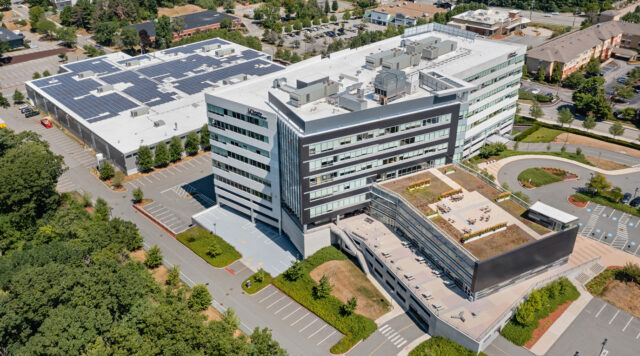
Tenants inked 1.9 million square feet of office leases in Boston during the third quarter. KKR committed to 133,000 square feet at Two International Place (the towers at left). iStock photo
Big leases by Hasbro and KKR at trophy office towers have generated buzz about the Boston office market after several years in which consolidations and downsizing dominated tenant activity.
“We’re seeing an uptick in leasing velocity because companies are realizing there’s only so much high-quality trophy space available,” said Roy Hirshland, Boston market leader and brokerage chair at Savills. “The companies are settling into their new reality. For the last five years, they were just holding the course, trying to get people to come back to the office.”
Beyond the high-profile transactions, stubborn double-digit vacancy rates and softness in lower tiers of the market point to additional distress for some office landlords. 2026 is likely to be a year of reckoning for some troubled properties, leading to an uptick in workout activity, distressed sales and foreclosure auctions, real estate executives predict.
Chris Condon, an attorney at Bowditch who specializes in distressed asset work, said foreclosures and bankruptcy filings will continue to shake out distressed properties in 2026.
“It really does depend upon how aggressive the lender is being and whether they want to foreclose,” Condon said. “If the bank has decided to cut bait and move on from the borrower, they are more aggressive and are willing to foreclose and take what they can get.”
Developers facing pressure from lenders are seeking joint venture partners to avoid losing ownership, Condon said.
Average Lease Sizes Trend Upward
A surge of office leasing activity totaled over 1.9 million square feet in the third quarter, including KKR’s 133,000 square-foot lease at 2 International Place and Hasbro headquarters’ relocation from Rhode Island lease to 400 Summer St.
According to Avison Young research, average office leases in Boston have steadily increased from 15,427 square feet in 2023 to 24,405 year-to-date.
The Boston availability rate – which stood at 23.3 percent in the third quarter – is likely to decline into the high teens in 2026, said Tucker White, U.S. office agency lead for market intelligence at Avison Young.
“That is a product of no new construction kicking off, and the new trophy buildings getting leased,” White said.
But many large tenants continue to downsize as leases come up for renewal, in a trend that’s been a steady component of the office market since COVID. Law firm Wilmer Hale, an anchor at 60 State St. since the 1970s, restructured its lease while committing to 201,018 square feet, down from 272,000 square feet in 2011.
Renewals accounted for 46.3 percent of all leasing activity in the third quarter, according to Avison Young.
Large established companies tend to renew and restructure leases in existing buildings, using generous tenant improvement allowances to modernize workplaces with post-COVID perks, Savills’ Hirshland said. Smaller companies with uncertain finances prefer shorter lease terms.

Keurig Dr Pepper’s two-building head office and R&D headquarters at 53-63 South Ave. in Burlington sold last week for $84.5 million in a deal brokered by Newmark, a 29 percent discount over its previous sale. Photo courtesy of Newmark
Givebacks Still Weighing Down Fundamentals
“There does seem to be an uptick in activity, but I’m not sure whether that translates into improving market fundamentals and decreases in vacancy,” said Mark Fallon, director of research and strategy at Hunneman in Boston. Large corporate users continue to trim footprints. Fidelity Investments is offering its 803,000 square-foot headquarters at 245 Summer St. for sublease as it prepares to occupy the redeveloped Commonwealth Pier office complex.
“I expect to see more of that, but for 2026, we are going to see momentum continue to build, barring a dramatic macroeconomic disaster,” Fallon said.
Tale of Two Investment Sales Markets
The investment sales market is increasingly bifurcated between well-leased properties selling for profits and “fire sales” driven by lenders, Avison Young’s White said. The trend is likely to spill over into 2026.
Buyer profiles have changed with the availability of some properties at steep discounts, including private capital and high net worth individuals. Office investment sales averaged $303 per square foot in Boston and $134 per square foot in the suburbs during the third quarter, according to Avison Young research.
A national survey of 120 commercial real estate executives by law firm Seyfarth Shaw released this fall predicted return-to-office mandates requiring four to five days attendance will drive demand for office leasing. But the survey ranked multifamily, industrial and data centers as the strongest CRE sectors.
Investors remain wary of office property acquisitions, said Andrew Shure, a partner in Seyforth Shaw’s Boston office.
“The quality in the market is where people see the most success. Buying an office asset has become an iffy proposition,” Shure said.

Steve Adams
Suburban Landlords Weigh Alternatives to Office
Residential conversions are starting to take a small dent out of the office space glut in downtown Boston. The city has received applications to convert 23 buildings into 934 housing units, under a program that offers 75 percent property tax abatements for 29 years.
Suburban office properties – with their typically larger sites – lend themselves to a wider range of repositioning and redevelopment opportunities, Avison Young Principal Michael Dalton said. And landlords are taking action.
“The suburbs are ahead of Boston in recognizing and admitting the downside,” Dalton said. “There’s been a lot of sales of really good real estate at ridiculously good prices. Landlords are pivoting.”
Suburban availability rates range from 17.7 percent in the inner suburbs to 23.8 percent on the Route 128 belt and 24.1 percent on the Interstate 495 belt, according to Avison Young research.
Vacant hotels and underutilized office parks in Waltham are proposed for redevelopment as apartment complexes. In Brookline, Allston-based City Realty Group is preparing to seek approval for a 738-unit apartment complex replacing the Chestnut Hill Office Park on Route 9.
Other suburban landlords are entertaining non-traditional uses for office buildings, such as “tough tech” tenants with an R&D component, Dalton said.
And parcels once envisioned for lab developments now are in pre-development for multifamily housing.
“The health of the market will change once that process finishes,” Dalton predicted.






